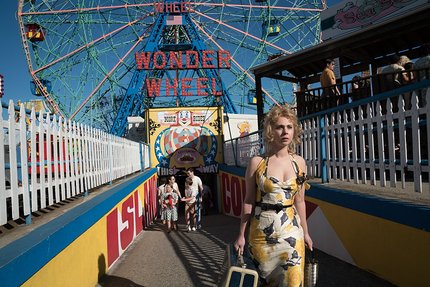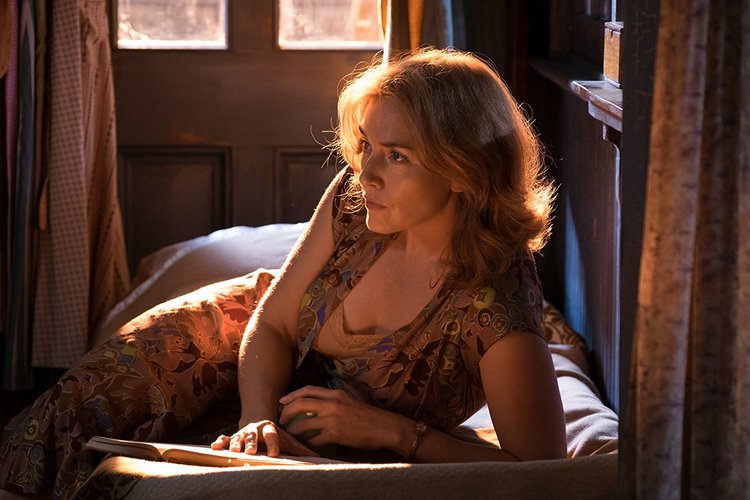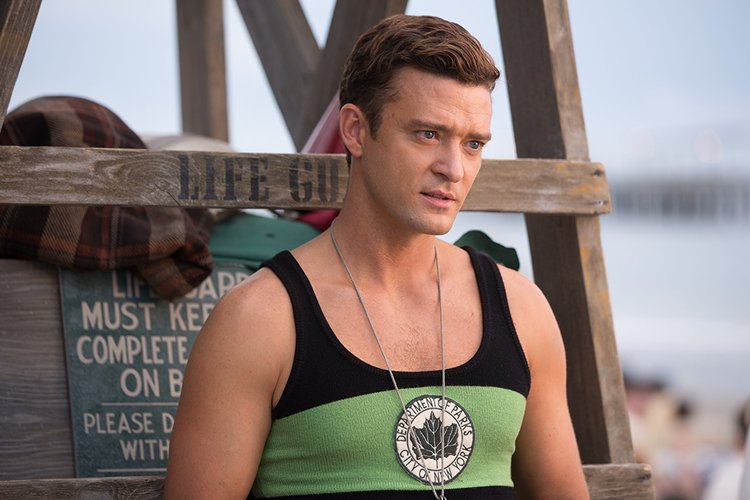Review: WONDER WHEEL Goes Around and Around and Around...
Woody Allen's latest drama stars Kate Winslet, Justin Timberlake, Juno Temple and Jim Belushi, at Coney Island of the 1950's

“I suppose you get used to all this noise?”
“No. I never get used to it. I hate it!”
That’s not Woody Allen responding to the relentless din of the media probing into his personal life and questioning just how much of a degenerate he is. Not directly, anyhow.
No, that’s Kate Winslet’s rundown character responding to what it’s like to live in an apartment directly above bustling 1950s Coney Island. All day every day, it’s an unending cacophony of roaring roller-coaster crowds, noisy kids, rides, bells, the pair of bays it straddles, and the incessant target shooting. Little does she know, in these early minutes, that she’s the bullseye.
Winslet plays Ginny, a dejected waitress married to an older abusive alcoholic boor (Jim Belushi, making an impression as a carousel operator called Humpty). They both have children from previous relationships. His daughter (Juno Temple) is a grown woman married to a gangster, and out of his life; Ginny's young son, Richie, (Jack Gore) is an oblivious grade school loner and a total pyromaniac.
Ginny, an aspiring actress enamored with the silver screen (as she puts it, she’s “playing the role of a waitress working at Ruby's Clam House”), hates the mundane life she’s found herself in. The Coney Island boardwalk might be an appealing place to visit, but can you blame her for not wanting to live there? Jenny, much like Mia Farrow’s character in Allen’s superior film The Purple Rose of Cairo, fantasizes about a way out.
Justin Timberlake plays Mickey, a student playwright working as a lifeguard. Mickey serves as our narrator, dishing up this visually vibrant nostalgic drama. Right out of the gate, he “warns” us, directly to camera, that he’s prone to using symbols, and loves big, colorful characters. (Thanks, Woody). He’s having an affair with Ginny, who quickly becomes completely obsessed with him. In her mind, he will be her savior, her salvation, and her ticket to a better life.
Mickey is a nice guy, but selfish. He’s so selfish that even in his own meta-retelling of this story with him in it, he still finds a way not to hear the grief of others, instead viewing their aired burdens as interesting character tics and narrative flavor. As soon as Carolina, Belushi’s character’s prodigal daughter, confides her past to Mickey, his stunned, self-centered response is “What a sheltered life I’ve led! I have book knowledge, but you...! You’ve really lived a life!” His affair with Ginny is quickly back-burnered for this younger, prettier, blonder catch.
Carolina is on the run from the mob, having cracked under investigative pressure back home. Her husband and his slick-backed steely enforcers (led by Paulie Walnuts himself, Tony Sirico), are hot on her tail, ready do away with her. Mickey’s affairs begin to work at deeper cross-purposes than even his empathic and perceptive mind can understand. As he puts it in one of his narrative monologues, “It was a pretty intense summer, and not just the humidity.“
It's hot all right, and not in any desired way. No dignified film critic wants to go dredging up dirt on the personal lives of those involved with the film in question, but on unfortunate occasions, it would be irresponsible not to. While far from being a one-to-one correlation, it’s difficult not to view Wonder Wheel through the filter of the director’s own decades-old scandals. A guilt-ridden man leaving an unstable mom for her daughter-by-marriage? Does one even need to further explain why such a premise (not to mention the way it plays out) is uncomfortable at best, particularly in the current climate of male/female relations?
“Separating art from the artist” has long been a broad truism for the artistically enlightened and those whom consider themselves such. But when the artist himself seems to be going out of his way to dance on that line that may separates the two, what to do then? Louis C.K., with his recently aborted film I Love You, Daddy reportedly dares the same stunt, featuring a Woody Allen-esque character, no less. And now, we also have this.
It’s hard to believe that Allen’s used up every last idea in that he’d accumulated on scraps of paper in the cigar box he keeps stored next to his bed. A lifetime of accumulated idea snippets saved for later (as revealed in Robert B. Weide’s Woody Allen: A Documentary), and yet he still must resort to taking one of his biggest film projects to date hostage in a hand-wringing telling of “his side of the story”? (Amazon Studios has been giving him more money to make movies than he's ever had access to before. This is the latest of these efforts.)
Back around the time of Blue Jasmine, when his former significant other and muse Mia Farrow and her son were once again on the warpath with abuse allegations, he explained his side of things to the press, ending with the assurance that that’s the last word he has to say on the matter. If memory serves, though, he never promised not to make entire movie allegories about it. Right down to Ginny’s son starting fires all over the place unprovoked, the symbols and parallels are right there. Everyone else fiddled about while Ronan burned, so to speak. No one is innocent, but some are more guilty than others.
But here’s the thing - all the real life unavoidables aside, Wonder Wheel isn’t all that wonderful. Like all Woody Allen films that aren’t out and out awful, this one has been shruggishly proclaimed as the filmmaker’s best work in recent years. It’s not. Merely middling in that sense, the eye-catching production design and all-in performances by Winslet and Belushi are most certainly redemptive qualities worth lauding.
The area in which Wonder Wheel most lives up to any hype its garnered, however, is in the cinematography department. Vittorio Storaro, the legendary director of photography with Apocalypse Now, The Last Emperor and Dick Tracy on his resume, is only marginally less legendary than Woody Allen himself. Storaro’s magic is on display throughout, as within vast outdoor shots, the light shifts from hard, haloing and bright to overcast and muted - on cue. However he achieved this effect, it's a wonder unto itself. Tonally, this Coney Island, recreated in exacting detail, runs the gamut between a purgatory of forever forced fun and a red neon Hades, with Ginny’s fiery hair to match.
So, step right up and buy your ticket to the Wonder Wheel. It’s noisy, it flashes, it goes around and around and around. It’s not a comfortable ride by any stretch, though the scenery has its bright spots.
Wonder Wheel
Director(s)
- Woody Allen
Writer(s)
- Woody Allen
Cast
- Jim Belushi
- Juno Temple
- Justin Timberlake
- Kate Winslet









